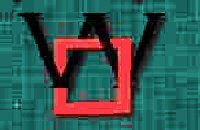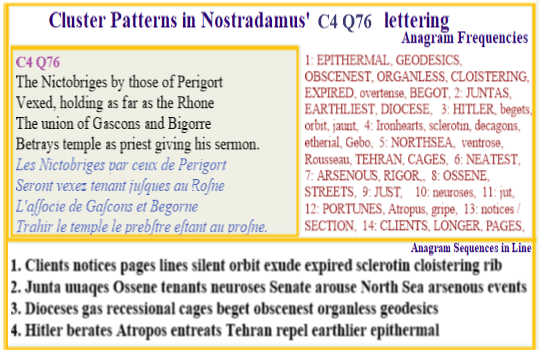 Analyses of all verses
Analyses of all verses
|
 Web Site
Web Site |
 All
Sefirots All
Sefirots |
Nostradamus C4 Q76: Hitler's experiments revisited in the future.
Copyright: Allan Webber, December 2015
 It is very unlikely that conventional analysis can
ever give the text of this averse a prophetic meaning.
It is very unlikely that conventional analysis can
ever give the text of this averse a prophetic meaning.
Yet anagram analyis gives a consistency that is both prophetic in the medium and longer terms.
In the first line of text the word Nictobriges contributes nothing of sense. However, its lettering helps shape anagrams that are biological in nature.
Both sclerotin ( ort Les Nic) and insect ( es Nict) are found and these are terms with logical connection (see reference below). Sclerotin is also a term used in the human skeleton particularly the ribs and other joints and represents the hardened material that binds them to the skeleton.
The anagram for sclerotin is followed by one for rib ( bri) and the words de Gascons et provide anagrams for cages onset ( e Gaſc - ons et). There are also anagram for gripes a cure ( riges p -a - r ceu) found in the first line and this identifies an ailment affecting the digestive tract of humans.
Together with other anagrams in that line it beomes apparent that Nostradamus is describing a person who searches for a cure for their clients ( Les Nict) within the ambit of alternative medicine.
There are however a set of anagrams that place this verse squarely in the 20th century. These include Hitler ( hir le te), obscenest ( ſcons et Be), Northsea ( oſne Trah), juntas ( ant juſ) and the combination of all these anagrams becomes the tale of the experimentation by the Nazi's on the prisoners in their war camps.
There is also an anagram for Atropus ( t au proſ), the goddess that guided man's fate in death. This tale then gives sense to the text and justifies its inclusion into the stream of Prophecies about reshaping the world through imposed genetic change.
# Atropos was the oldest of the Three Fates, and was known as the "inflexible" or "inevitable." It was Atropos who chose the mechanism of death and ended the life of each mortal by cutting their thread with her "abhorred shears."
# gripe: gastric or intestinal pain; colic.